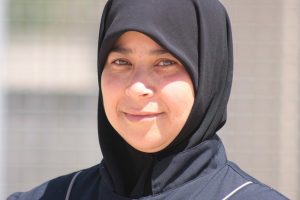“Life didn’t end after all”
I am a mother of 6 children, 3 are from my second marriage.
I fled with my husband, his children and mine from Eastern Ghouta from the chemical attacks that took place in 2013 in “Zamalka” a village next to ours. We first arrived to Damascus. It was very difficult for my husband to bring food to the table since lots of members of the family decided to move to Damascus too. He is 65 years old and he is sick. We reached a point where life was unbearable in Damascus, so we decided to move to Lebanon with my 2 children in addition to my husband’s daughters and their children. After a long humiliating process at the Syrian borders where my husband had to go back to Damascus to bring additional papers, I crossed the Lebanese borders with my two little children and reached AL-MARJ camp in the Bekaa Valley in 2014, where my husband’s son lives. All the way from the Syrian borders to AL Marj camp, we were dreaming of arriving to Lebanon. We were running away from bombings and the bad living conditions, and we thought that “Lebanon is going to be SOMETHING”, it would end part of our sufferings. When I first reached AL Marj, all I found is one little tent. Not any tent. A military one where my husband’s son and his family live. I looked at him and asked “Is this where we are going to live?” He said “yes”: It was a total shock for me. I was depressed, I became really sick for a while: I had stomach pains, vomiting, etc. After succeeding to have a separate tent, a sudden decision to demolish Al-Marj camp deported us again to another Camp in Bar Elias.
At a very tricky moment where I was totally desperate and depressed, Action for hope opened an illiteracy class for women (2015). The school, where the classes took place, was very close to the camp. This is where we started to feel comfortable and we started to love being in Lebanon. During the classes, we used to have conversations and discussions about our daily lives. There were so many women who were reunited after long disputes. We became closer to one another. I couldn’t wait to go to those classes, it was a breathing space for me: even in the break time, I used to run to my tent, feed my baby and go back quickly to the class to spend time with my colleagues as much as possible. Then I was chosen to take part in a creative workshop (2016) where we shared our personal stories. I told stories of Al-Ghouta siege. During the workshop, I learned few techniques of how to make my story more appealing and make people relate to it. We did one performance and I found myself so happy: I didn’t expect that one day I will be able to speak in front of hundreds of people and reveal intimate things about myself. My story was about my return to AL-Ghouta for a visit after having a dream that I went back there. The story I shared was very touching and sad. Yet, we decided to end it in a very funny way that brought back laughter to the audience.. Before starting the storytelling and theatre workshops, I used to spend my time crying thinking of my daughter who stayed in Syria and worrying: When will I be back to Syria? Will I be ok tomorrow? When I joined the workshops, I felt much better, I was somehow relieved and it reflected positively on my family: my husband stopped seeing me crying all the time, my time was full and that of my children was full too.
What was most significant is the psychological relief I felt: Hope is still here and there is still something worth living for. Life didn’t end after all. When the performance took place, many women from the camp attended. They were proud of me and some of them joined the action for hope afterwards.
There were no real negative changes that took place: when we used to have the sessions in Ghazzeh, I was obliged to leave my baby alone for three hours (the road trip takes one hour) and may be, few bad words from some of the neighbors in the camp: “after all that age, you want to learn do theatre?? You are doing this for the money?”
No I didn’t do this for the money and I want to go further and learn more things.

Author: Khayria Darwish 39 years old, from Ghouta, Syria
Activity: Creative Writing and Storytelling (2015-2017)
Story collected and compiled by: Mona Merhi
Date and place: Sunday may 7th | , 2017Bar Elias Cultural Center – Action for Hope


